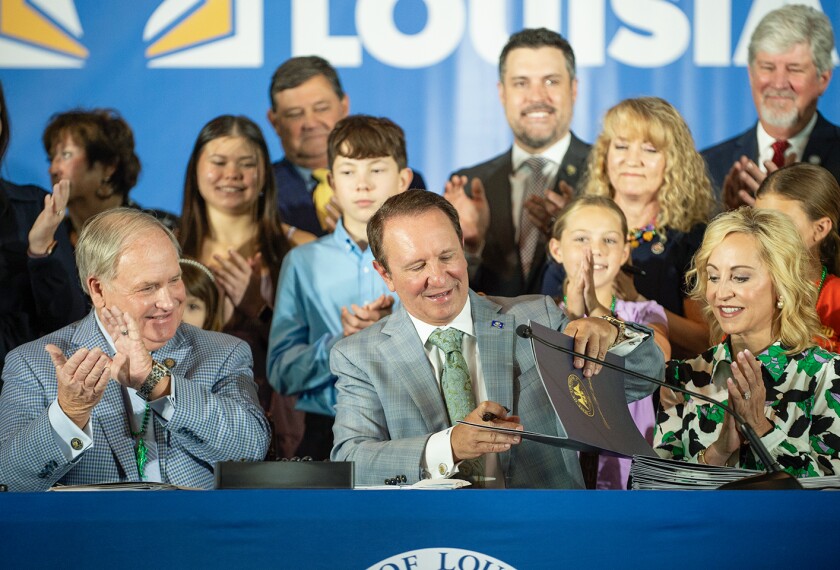A civil rights group criticized Dallas school officials last week because they haven’t removed an elementary school principal who was found by a federal judge to be illegally segregating African-American and Latino children from their non-Hispanic white peers.
The Mexican-American Legal Defense and Educational Fund, a Latino advocacy group, had sued on behalf of Lucresia Mayorga Santamaria, saying that two of the Dallas mother’s children were discriminated against because they were assigned to English-as-a-second-language classes at Preston Hollow Elementary School based on their ethnicity, not their language ability.
Read the court ruling, posted by the Mexican American Legal Defense and Educational Fund.
In a 107-page ruling issued Nov. 16, U.S. District Judge Sam A. Lindsay ruled that Teresa Parker, the principal of Preston Hollow, was personally liable for violating the children’s rights under the equal-protection clause of the 14th Amendment to the U.S. Constitution. He ordered the principal to pay Ms. Santamaria $20,200 in damages.
Judge Lindsay gave the 161,000-student Dallas school district until Jan. 17 to eliminate segregation at the school. The judge stopped short of finding the district or higher-level administrators liable for the situation at Preston Hollow, but he wrote that district officials were “asleep at the wheel.”
“I was pretty shocked that the district didn’t come out immediately and state they were going to terminate [the principal] or relieve her of her duties,” David G. Hinojosa, MALDEF’s lead lawyer in the case, said in an interview last week. “For a district that serves a substantial number of minority children, what message are they sending to those children and families by keeping this principal?”
But Kaky Wakefield, the vice president of the parent-teacher association at the school, said that except for the two parents who complained, she believes Preston Hollow parents want Ms. Parker to stay.
“Teresa Parker is there for every child at that school,” she said. “To paint her as a racist and segregationist is truly offensive.”
Clyde A. Henderson, a spokesman for the Dallas district, acknowledged last week that Ms. Parker was still in her position, and he said that the situation was being investigated.
He declined to comment on the court ruling, except to say that the district was looking at schools to make sure illegal segregation isn’t occurring, and was “making sure schools know what they are supposed to do.”
Ms. Parker didn’t return phone calls left at Preston Hollow Elementary last week seeking comment.
‘Separate But Equal’?
Judge Lindsay said in his opinion that Ms. Parker “was, in effect, operating, at taxpayer’s expense, a private school for Anglo children within a public school that was predominantly minority.”
The plaintiffs argued that African-American and Latino children who were fluent in English were assigned to classes designated as ESL, while non-Hispanic whites generally were not.
The judge held a trial in August, with three teachers and an assistant principal testifying on behalf of the plaintiffs. No teacher testified on behalf of Ms. Parker or the other defendants.
The judge quoted a Preston Hollow teacher as testifying that Anglo children had been assigned to classes that were primarily Anglo because “the people who live in the Preston Hollow neighborhood, who are the majority being white, would want their children grouped together.”
The judge said he was “baffled that in this day and age, defendants are relying on what is, essentially, a ‘separate but equal’ argument.”
Preston Hollow’s 445 students are about 18 percent non-Hispanic white, 66 percent Latino, 14 percent African-American, and 2 percent Asian, according to the ruling.
Ms. Wakefield and Joe Bittner, another parent at the school, said Ms. Parker never gave them any indication she had grouped white children in classrooms and, in fact, they chose the school because of its diversity. Ms. Wakefield’s twin 4th-grade boys are in classrooms that are about one third non-Hispanic white and two-thirds minority, she said.
According to court papers, the principal testified that children in English-as-a-second-language classes at Preston Hollow receive a general education regardless of whether they are English-language learners or not, and they receive the same curriculum as regular students. She told the court she had never assigned a student to a particular classroom based on race or national origin.
Judge Lindsay said in his opinion that Ms. Parker’s testimony “at times lacked credibility, was evasive and confusing.”




